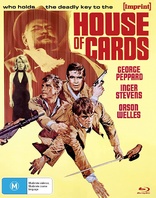House of Cards Blu-ray Movie
HomeHouse of Cards Blu-ray Movie 
Imprint #98Imprint | 1968 | 105 min | Rated ACB: M | Dec 29, 2021
Movie rating
7.3 | / 10 |
Blu-ray rating
| Users | 0.0 | |
| Reviewer | 4.0 | |
| Overall | 4.0 |
Overview
House of Cards (1968)
Leschenhaut and Morillon are trying to organize a plot to overthrow the French government and set up a new fascist organization. Their plans are interrupted by Davis, an American boxer, tutor of young Paul de Villemont; in Villemont Manor he discovers the plot and, after the kidnapping of the boy, he travels to Rome, where the organization would exchange Paul with a list of members stolen by Davis to give to the press.
Starring: George Peppard, Inger Stevens, Orson Welles, Keith Michell, Maxine AudleyDirector: John Guillermin
| Crime | Uncertain |
| Drama | Uncertain |
| Mystery | Uncertain |
Specifications
Video
Video codec: MPEG-4 AVC
Video resolution: 1080p
Aspect ratio: 2.35:1
Original aspect ratio: 2.35:1
Audio
English: LPCM 2.0
Subtitles
English SDH
Discs
Blu-ray Disc
Single disc (1 BD)
Playback
Region free
Review
Rating summary
| Movie | 4.0 | |
| Video | 3.5 | |
| Audio | 5.0 | |
| Extras | 3.0 | |
| Overall | 4.0 |
House of Cards Blu-ray Movie Review
Reviewed by Dr. Svet Atanasov January 23, 2022John Guillermin's "House of Cards" (1968) arrives on Blu-ray courtesy of Via Vision Entertainment. The supplemental features on the disc include an exclusive new audio commentary by critic Scott Harrison; vintage promotional materials; and music & effects audio track. In English, with optional English SDH subtitles for the main feature. Region-Free.
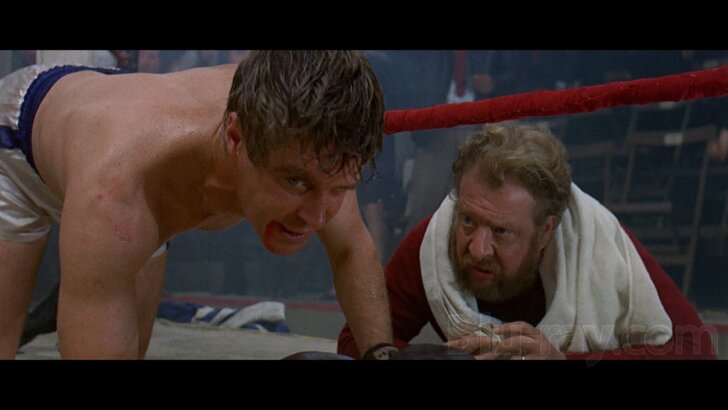
"What round is this?" "Still the first."
Consider the following scenario: It is 1968, and instead of directing Toby Dammit, Federico Fellini becomes fascinated with a much bigger project. A very different one, too. It is a lavish action film at the center of which is a complex conspiracy whose deranged mastermindís lair happens to be in Felliniís favorite city, Rome. Instead of having an Englishman (Terence Stamp) do the main protagonist in the film, Fellini chooses an American (George Peppard), then shortly after, welcomes Orson Welles and, while dining together at his favorite restaurant on Via Veneto, asks him to play the deranged mastermind. Born and raised in Genoa, Piero Portalupi is a great choice to lense the film, so Fellini hires him. Nino Rota is busy working on another project, so someone suggests that Fellini tries Frenchman Francis Lai. Why not? Lai has already scored Claude Lelouchís Oscar-winning A Man and a Woman.
Does this sound like an utterly ridiculous scenario? Of course, it does, but only because you have not seen John Guillerminís House of Cards. I will explain what I mean, but first I would like to give you a good summation of its plot.
Peppard plays lousy American boxer Reno Davis, who has run out of luck in Paris. After he nearly gets his face destroyed in the first round of his final match, his corner throws in the towel, and he is sent back to the dressing room. Later that night, Davis and his best pal pack agree to pack up their bags and leave the city. However, while passing through a very affluent neighborhood, they have an unusual experience -- a boy empties his gun into their car and nearly kills Davis. He chases him back to his home, a massive gated mansion, walks in, and meets his mother, Anne de Villemont (Inger Stevens), as well as other members of the family residing there. After the boy is forced to apologize and his mother accepts responsibility for his Ďmistakeí, Davis leaves. A few days later, as he is leaving the city, Davis has a second encounter with Mrs. Villemont, who invites him in her Rolls-Royce and offers him to become her sonís tutor. If Davis accepts the position, he will teach him how to be like other boys his age in America. Davis is broke, and all of his belongings are in an old duffel bag, so he accepts on the spot.
While working inside the gated mansion, however, Davis discovers that Mrs. Villemont isn't just a heartbroken widow, but a prisoner who has an extremely complicated relationship with the other members of her family, and that they are all nostalgic about pre-independence Algeria. Davis also learns that, for some unknown reason, the man who used to have his job unexpectedly turned up dead in the Seine. Soon after, while teaching Mrs. Villemontís son how to play baseball and trying to avoid trouble with her family, Davis almost gets a bullet in his head. He promptly deals with the shooter, but instantly finds himself sinking into a rabbit hole where life is as cheap as a pack of cigarettes.
Based on Stanley Ellinís novel of the same name, House of Cards is one of those transitional action films from the late 1960s with roots that are easily traceable back to the classic film noirs, but with an appearance and attitude that make it unmistakably modern. Needless to say, its stylistic identity is very interesting because while in many ways it reminds of that of the trendy early James Bond and Eruospy films, it emphasizes vintage European glamour that feels very authentic. This is precisely the reason why I speculated above that it would have been the type of project a grandmaster like Fellini quite easily could have directed.
The plot is so unhinged it feels surreal, but it is definitely right for the type of thrills the film was conceived to deliver. Virtually all of them are thrills that emerge from the unusual reality in which Peppard and Stevens are forced to survive, so the exceptional locations and terrific emphasis on period detail are truly quite impressive. (If there were any sets or even structures that were built specifically for the film on the lots at Cinecitta, it is impossible to tell).
Peppard gives a very interesting performance that makes his failed boxer look like one of those reluctant bad-turned-good loners American action films loved promoting during the late 1970s and 1980s, but instead of jeans, he wears a suit. He is a straight shooter with a great arsenal of catchy lines, too. Welles had clearly figured out that he was in a Ďdifferentí film as well because he looks genuinely unhinged and spooky.
Laiís score is a minor masterpiece, so critic Scott Harrison is right to point out in his commentary that at times it actually makes it awfully difficult to concentrate on the visuals.
House of Cards Blu-ray Movie, Video Quality 
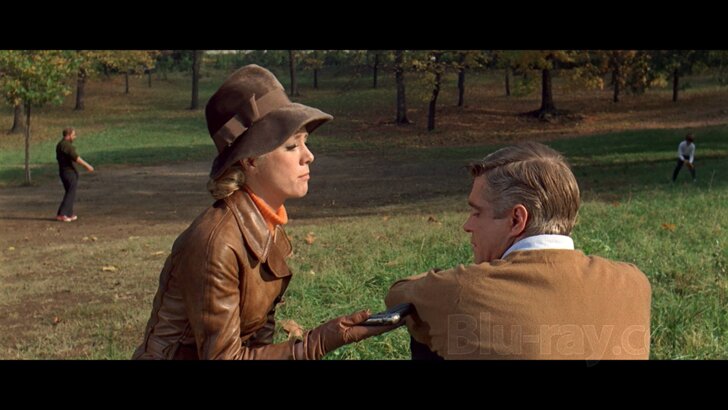
Presented in its original aspect ratio of 2.35:1, encoded with MPEG-4 AVC and granted a 1080p transfer, House of Cards arrives on Blu-ray courtesy of Via Vision Entertainment.
This film has some absolutely breathtaking visuals that actually made me speculate that it could have been directed by a very adventurous Federico Fellini. If one day it is fully restored in 4K, it will look sensational on Blu-ray.
This release is sourced from an older master that was supplied by Universal Pictures. The master reveals some traces of digital enhancements, but fortunately, they are light enough not to completely wipe out the organic strengths of the visuals. As a result, most of the close-ups can look rather decent; some indoor footage looks fine, too. The wider panoramic shots from Rome are mostly decent, but the larger your screen is, the easier it will be to conclude that a brand new master will make quite a difference. Color balance is good, but there is plenty of room for rebalancing adjustments that will strengthen the supporting nuances and fix some highlights that may appear overblown. Image stability is very good. Finally, there are no distracting age-related imperfections, such as large cuts, damage marks, warped or torn frames. (Note: This is a Region-Free Blu-ray release. Therefore, you will be able to play it on your player regardless of your geographical location).
House of Cards Blu-ray Movie, Audio Quality 
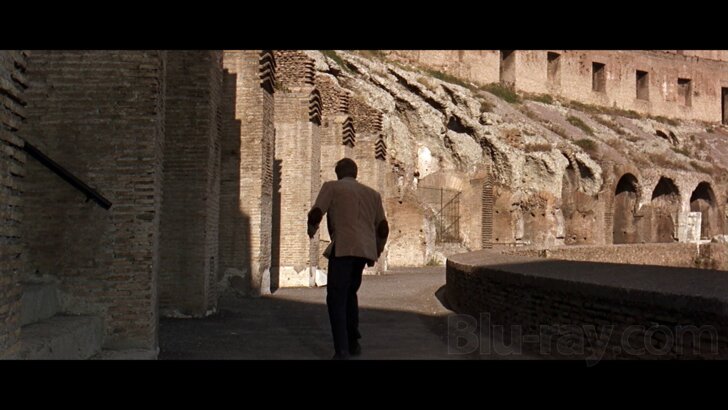
There is only one standard audio track on this Blu-ray release: English LPCM 2.0. Optional English SDH subtitles are provided for the main feature. When turned, they split the image frame and the black bar below it.
Even though there are a few areas where the music can sound a bit thin, I think that the lossless track is very strong. To be honest, I am unsure if there is even room for some minor yet meaningful cosmetic adjustments because clarity, roundness, and stability are excellent. Perhaps some dynamic ranges can expand a bit, but I think the overall quality of the lossless track is really good.
House of Cards Blu-ray Movie, Special Features and Extras 
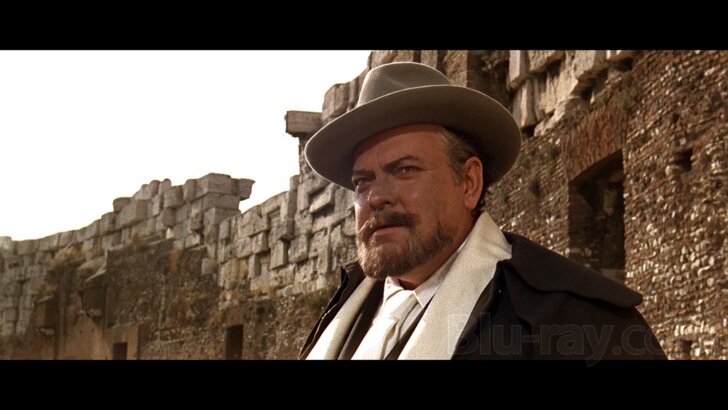
- Trailer - a vintage theatrical trailer for House of Cards.
- Music and Effects Track - presented as LPCM 2.0.
- Photo Gallery - a vintage theatrical trailer for House of Cards.
- Commentary - this new audio commentary was recorded by critic Scott Harrison, who offers a nice deconstruction of House of Cards and its stylistic identity and shares plenty of information about the famous stars that made it. (There are some pretty good and factual observations about George Peppard's reputation as a difficult actor and how his perfectionism eventually forced some studio bosses to declare that he was "a pain in the ass" to work with. If you enjoy the film, find the time to listen to the commentary in its entirety.
House of Cards Blu-ray Movie, Overall Score and Recommendation 
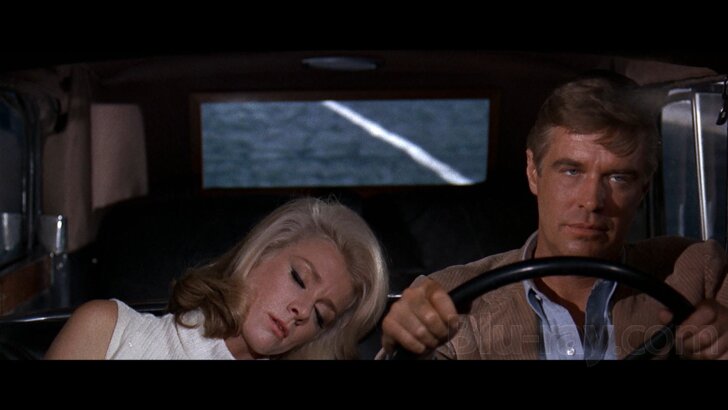
Some people insist that Michelangelo Antonioni's first English language film, Blow-Up, was conceived to be multiple things at once, one of which was a good old-fashioned thriller. To be honest, I feel that John Guillermin's House of Cards was conceived to be something very similar. In fact, had it been directed by Federico Fellini, I would have sworn that Antonioni's film was its inspiration. House of Cards is a very surreal film that does things the trendy early James Bond and Eurospy films do not, folks, and I found this incredibly attractive. George Peppard is very much in his element, and there is a pretty unhinged cameo by Orson Welles, so there are plenty of fireworks as well. On top of this, the film benefits a great deal from yet another sublime soundtrack composed by Francis Lai. I am really happy that Via Vision Entertainment decided to bring it to Blu-ray. HIGHLY RECOMMENDED. (In 1968, Peppard and Guillermin teamed up for another very wild film, P.J., which was recently restored and made available on Blu-ray by the folks at Kino Lorber. If you do not yet have it in your library, consider picking it up as well).
Similar titles
Similar titles you might also like

The List of Adrian Messenger
Hollywood Gold Series
1963

Warning Shot
Imprint #177
1967

The Limey
Blu-ray + Webstore Exclusive O-Ring
1999

The Gambler
Imprint #49
1974

13 West Street
1962

The Brotherhood
Imprint #119
1968

The Chalk Garden
Imprint #43
1964

Things to Do in Denver When You're Dead
Imprint #144
1995

Twilight
1998

Under Suspicion
2000

P.J.
1968

The Alfred Hitchcock Hour: Season One
1962-1963

Jack Irish: Bad Debts & Black Tide
2012

Death on the Nile
Classics Remastered
1978

Dirty Pretty Things
2002

The Ipcress File
1965

Electra Glide in Blue
1973

Murder on the Orient Express
Classics Remastered
1974

The Scarlet Hour
Imprint #152
1956

The Face Behind the Mask
Imprint #44
1941
